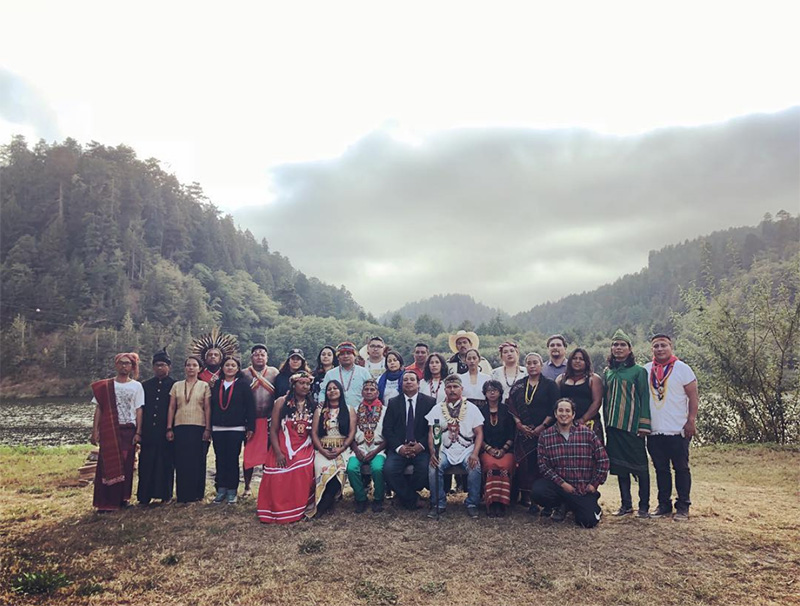One of the problems we face now is the crass individualism that are being promoted. You know as an autonomous individual you don’t care what happens to your neighbor or your environment and that I think is one of the major problems that the world faces now and I think values of Indigenous Peoples in terms of solidarity, collective living and behaviors as well as reciprocity, linking very closely with the Earth… these are the values people should really learn about.
Vicky Tauli-Corpuz UN Special Rapporteur for Indigenous Peoples
Collective action. We cannot save this planet alone and it is too simplistic to think that only indigenous peoples and local communities are the answer. Whilst there is a vital need to restore security to indigenous and local community lands, supporting them in their struggle to protect forests we must also look within ourselves to bring about change. How are we living? Are we contributing to the destruction of our environment? Are we still connected to the earth, the seasons, the plants that grow through the cracks of concrete in our cities? We can no longer sit aside and just wait for others to stop the rot, to hold back the pollution and unhappiness that seems to come with modernity. We need to be the change we want to see.
The UN gives us 12 years to catastrophic climate change, the next two are vital to shift the thoughts of our political leadership into action. Frontline communities from Brazil to California are facing severe threats to their lives and time is running out. Direct action is vital and groups like Extinction Rebellion in our cities and APIB in the jungles of Brazil are putting their livelihoods on the line. In the remotest parts of the world this often has life threatening consequences. To grow this struggle we also need to build connection and connectivity, fuse the vibrant neurons and synapsis of our global conscious. To build a new future we need a new story, new narratives of what we can be.
This year at ‘If Not Us Then Who’ we used storytelling tools to connect people and build online communities – Virtual Reality, documentaries, smart phones, film festivals and social media – but this is only one part. It is not enough to just interpret the lives of others through the lens of our own understanding. We need to create space where people can meet face to face and we need to take the time to connect with others, to really receive someone and share their problems, support them when they are feeling pain or amplify them in their success. We need to start to think as a community.
This year, with our community partners (AMAN, COICA, APIB & AMPB), we have grown our networks by reaching out to new allies in the Yurok territory, at the Hip Hop Caucus, Nia Tero, the Land Tenure Facility, Rainforest Action Network, the Pachamama Alliance, Amazon Watch and many other global NGOs. We have promoted a new group of indigenous filmmakers, run a workshop in Panama and given film commissions to a diverse range of content producers. We have tried to find common ground and shared experience to bring different groups together. It has been a wonderful year of significant achievements: from our growth online to the ‘Our Village, Community Corner’ – 4 day event in San Francisco; our support of the #GuardiansoftheForest delegation and our diverse range of beautiful impactful short films. It has been another massive year for our organisation. What we have achieved is not the result of an individual but it is the result of a collective or community, a group of like minded and supportive people. A wonderfully insightful and passionate team that works tirelessly to amplify indigenous and community leaders, honouring their wisdom and supporting their needs. I wanted to take a moment at the end of the year to name the community of people that make up the team at If Not Us Then Who? Tim Lewis, Sophia Cheng, Hugo Metz, Jaye Renold, Thalia Gill, Elsia Yuanti, Josephine Crouch, Brittany Neff, Bruno Teixeira, Aiden Rumble, Kelby Wood, Mina Setra, Candido Mezua and Bill Pullman – Thank you.
From this mostly online but occasionally in person community of passionate and skilled professionals we have ensured a constant drumbeat of support for the community partners we champion. Thank you, I am blessed to work with such beautiful, talented and compassionate individuals. It is communities like these that stop me from feeling overwhelmed by the enormity of the task we face. By working together and thinking collectively we can change the course of the future of our planet.
With Love.
Paul
